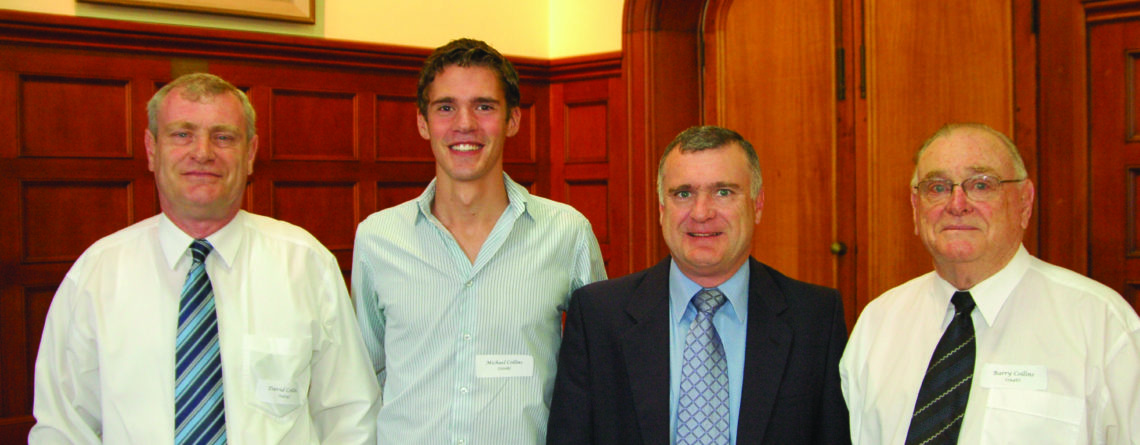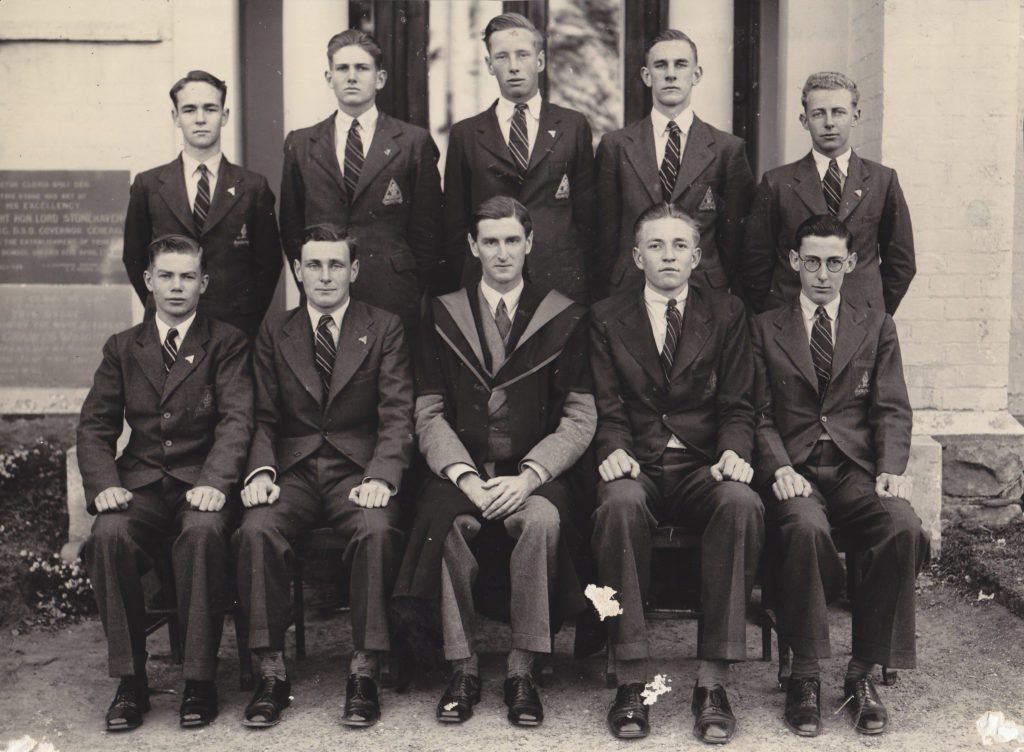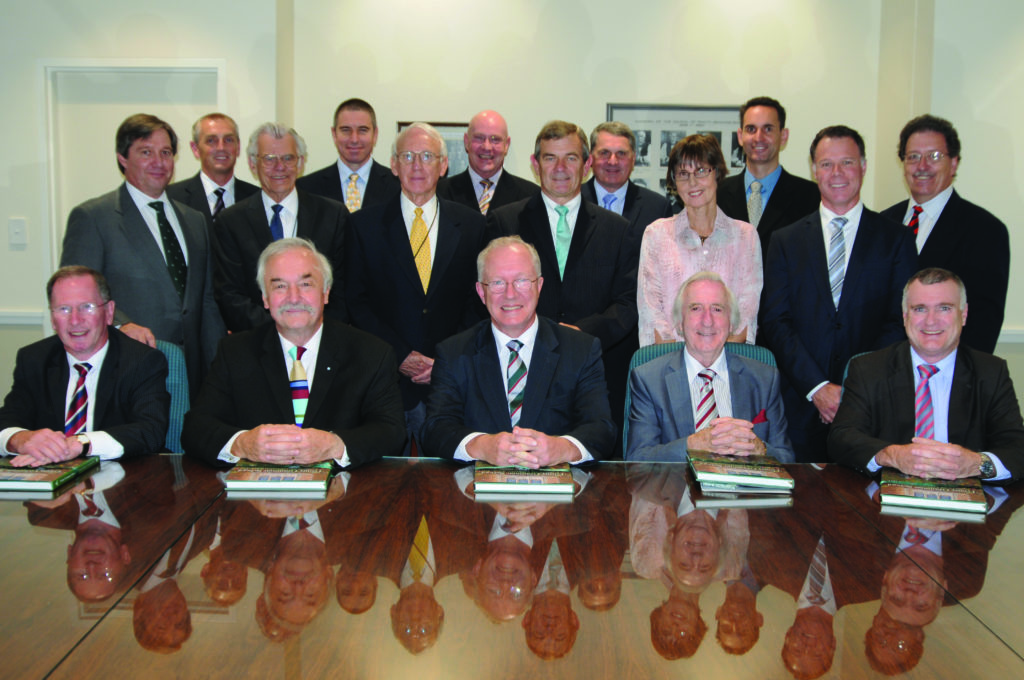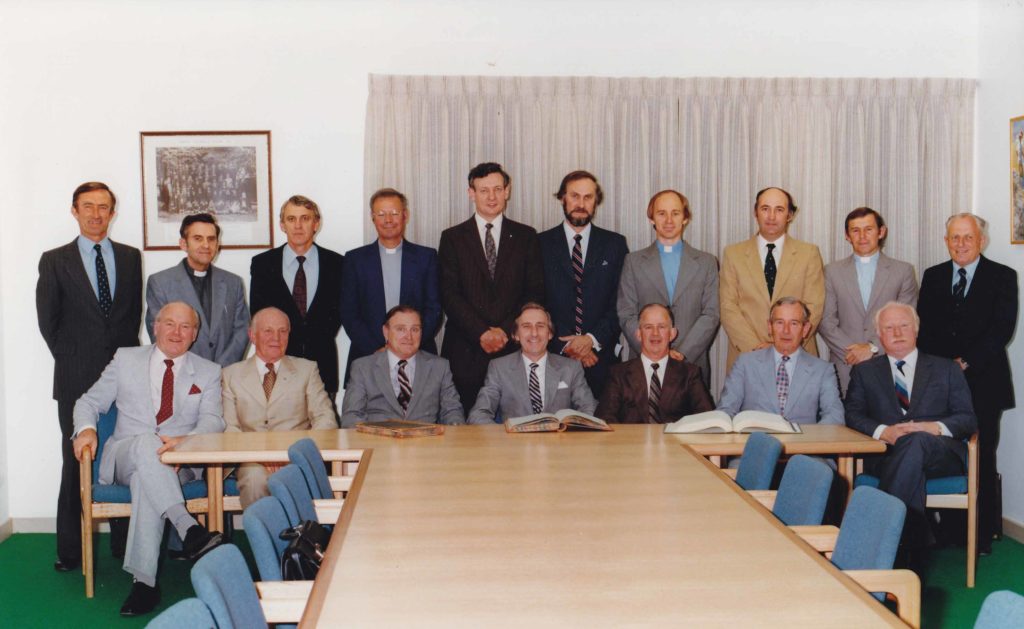One family’s century of service
One family has achieved a remarkable century of cumulative associations with Trinity – 33 years as students and more than twice that as voluntary servants of the School.
Three generations of the Collins family have spent their school days at Trinity in a line stretching back to the dark days of World War Two, when patriarch Barry started high school.
Since then, the family’s history has been one marked by service and leadership.
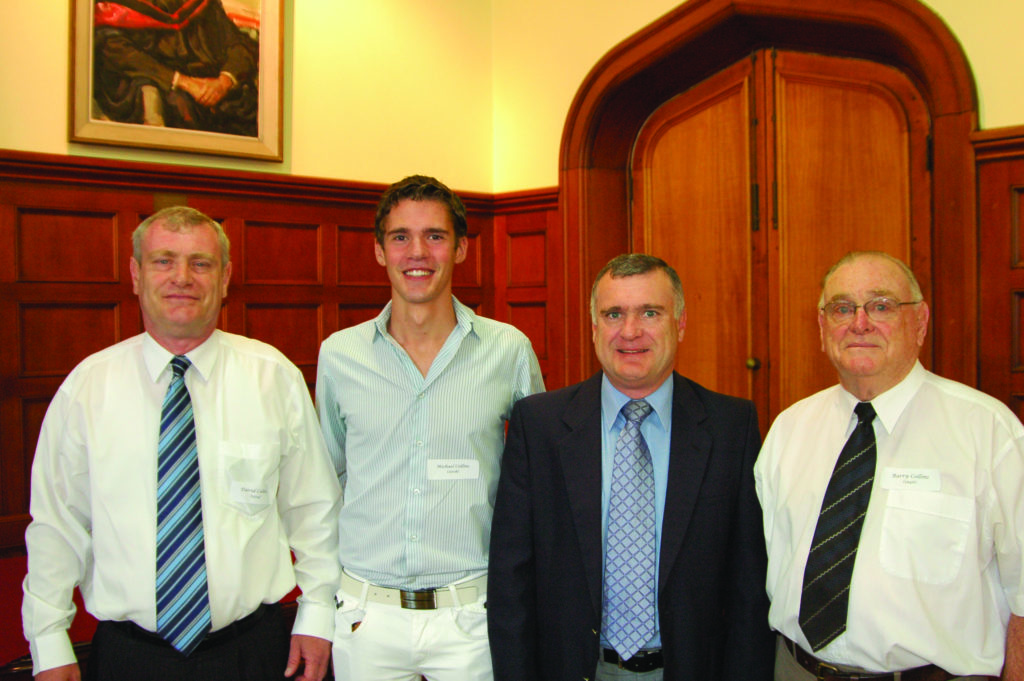
Barry, School Captain in 1946, went on to head the Old Trinitarians Union in the 1960s and served for 21 years on the School Council, 18 of them as Chairman of the Executive Committee, until 2001.
His younger son Peter made it a father-son double as School Captain and council member, leading the student body in 1975 and serving on the School Council for the past 20 years, 10 as Chairman of the Executive Committee.
Barry’s older son David was a prefect in his final year, 1974, as was Peter’s son Michael in 2008.As if a combined 41 years of voluntary council work isn’t enough, Barry’s wife Pam served on the Strathfield Auxiliary and in the tuck shop, plus more than 20 years as a volunteer in the School archives office.
And Barry’s father Arthur was President of the Parents and Friends Association in 1948 and later served on the War Memorial Chapel fundraising committee.
All of which adds up to over 100 years of Trinity life for one family.
And yet … when Barry joined, one of the first things he faced was the very real possibility of the School’s closure.
“In 1942 after Japan entered the war Trinity was declared to be in a danger zone because of the nearby industrial areas at St Peters and Redfern. A lot of families withdrew their children from the school,” recalled Barry, now a sprightly 92.
“It was a small school then and didn’t have any money at all. The Standing Committee of Synod had decided to close it and sell all the assets and land. It is to the credit of the School Council that students were unaware of the perilous situation.”
Three members of the School Council came to the rescue with financial assistance – Messrs Young and Taubman, whose names live on in the School houses, and AB Kerrigan, QC, an old boy who said: “Trinity will still be here long after we are all dead.” How right he was.
Barry, an only child whose dad worked at the Sydney County Council, excelled in sport. He was a first XV rugby player, a first XI cricketer and captain of Track and Field, as well as a senior lieutenant in Cadets and School Captain in 1946.
“That was good training for me. Universities don’t teach management or leadership, so it gave me a good grounding in that, as did Cadets, which it still does today.”
He studied chemical engineering and joined ICI in 1955. He was seconded to India for two years to start up a plant, taking his young family with him. Later he became managing director of Catoleum, a joint venture with a US company, and chairman of the board of three overseas companies in New Zealand, Indonesia, and Singapore.
He was awarded an AM in 2015 for his significant work in chemical engineering, particularly in the mining, paper, and steel industries, and to the community.
He joined the School Council because “I was in a position to do it”.
“You can’t just be a member. You’ve got a duty to do what you can. In my last 11 years (in business) I had 58 international flights. I was organised. I would arrange board meetings overseas around my Trinity commitments.”
It’s an attitude, and a responsibility, taken up by his son Peter (class of 1975), who has served on the School Council for 20 years.
“I am very much in my father’s mould. It is a lot of work but everybody contributes,” said Dr Peter Collins.
“I’m passionate about the School; you wouldn’t be there if you weren’t.
“You are helping to shape policies for a large Anglican boys’ school – that makes a difference.
“I like the people I work with. Nobody is there to dominate and we are all there to contribute to the School. You get to know the teachers and senior staff, and they’re good people.”
He is a captain in the Royal Australian Naval Reserve, where he has spent 31 years, and his attitude to service is: “If I can do that job, I should do that job.”
He took part in rugby, cricket, athletics and Cadets during his school days, saying: “I still play rugby in my dreams; I always seem to play better in my dreams”.
Being appointed School Captain in 1975, Rod West’s first year as Head Master, was the “icing on the cake”.
“It shaped how I do things and how I think. I had to get up every day in front of the school. It’s daunting to start with, but it has served me well for the rest of my life.”
He studied medicine at UNSW, where he met his wife Vanessa, then spent six years in teaching hospitals. In 1986 he joined the Turramurra general practice where Vanessa had started 18 months earlier.
They have three children – Josephine, a gastroenterologist, Madeline, a lawyer based in London, and Michael, another Trinity old boy who works in communications handling Microsoft business in Seattle.
Dr Collins believes Trinity is an even better school now than it was in his student days.
“Academically it’s more rigorous. That’s probably true of all schools, but it’s certainly true of Trinity.
“It also has much better pastoral care. In the house system, there’s vertical knowledge of how boys are going and whether they are having difficulties.
“TESS (the School counselling department) is a big entity in itself. There is an identifiable person to go and see if you are having problems. There are much better relations generally between teachers and boys. There has to be a distance but there’s a lot more communications and contact.
“There are more sports on offer, too, with great facilities. The boys are very lucky.”
Challenges facing the School Council are many and varied, including enrolments, budget, government grants, communications, building programs, and the health of the boys, particularly during the pandemic.
“But the most important decision a school council ever makes is appointing a Head Master,” he said.
“We’ve had only three changes in Head Master since World War Two. I think that’s very instructive. They have all helped shape the School to what it is today. Trinity has been very lucky.”
Peter’s older brother David, who was a year ahead of him, was a prefect in 1974 and Vice Captain of Archer house, two roles also filled later by Peter’s son Michael.
“We were very fortunate, one to have a Trinity education, and two to have parents who took an interest in everything we did,” said David Collins.
“Dad was an absolute inspiration right from the start.”
When it comes to service, he says: “Just go and do it. We are all very community-minded and conscious of the need to help your fellow human beings, to be there for people, to have integrity.
“In my opinion Trinity is very good at developing gentlemen. Sure, you can succeed in academics and on the sporting field, but at the end of the day it produces gentlemen. And I don’t think that’s common in all schools.”
“Trinity gave me the chance to be a leader. It ingrained in you certain elements of mateship, responsibility, and respect for people.
“You take that into later life, and business life, along with how to communicate to people.
“Mum and Dad did not come from salubrious backgrounds. Dad was a self-made man, and Trinity helped develop him as an individual.”
David was involved in rugby, athletics, swimming, and cricket, captaining the second XI in his final year.
He attended Sydney Technical College to study accountancy, later completing a master’s degree in business at UTS.
David, married to Anne, worked in finance and accounting, and spent the eight years before his retirement as business manager at St Paul’s Catholic College in Greystanes, near the family home, where his twin boys, now 30, went to school.
He believes Trinity has benefitted greatly from the longevity of its Head Masters, such as James Wilson-Hogg, Rod West, and Milton Cujes.
“I’m a firm believer in the culture that comes from stability. The School will continue to succeed because of its gentlemanly culture and mateship.”
Peter’s son Michael Collins (class of 2008) says having a grandfather, father, and uncle at Trinity before him had a “profound impact” on his schooling.
“I had a great sense of respect and insight into how the School operates,” said Michael, who spent a gap year working in a school in London before studying arts / media at Macquarie University and starting his communications career.
“You were given opportunities to excel, and the tools to make it happen. It fostered an atmosphere of collegiate brotherhood.
“Walking into the Assembly Hall or down the corridor and seeing their names on the honour boards… I was always encouraged to do my best but also to do what I loved, and to make the School my own experience.
“Fortunately, I got my name up on some of the boards, too.”
His proudest memories include being part of a diving team which won the CAS title for 20 years in a row, and taking on Extension 2 English in the HSC.
“Being asked to be a prefect was a huge honour, as was being part of the leadership in Archer House; I had the opportunity to carry on that family tradition, representing the School inside and outside.
“Dad was a role model and the mentality he lived by and passed on to his kids was to think more about what you can give back to the School, not just what the School can do for you.
“My entire family has had a fantastic experience with the School. If I was to have kids my first thought would be to send them to Trinity.
“I can’t overstate how much Trinity has helped shape my core values. It has had a profound effect on my personality and how I want to present myself to the world.
“The School instilled a great sense of work ethic. I was always encouraged to strive for success.
“My family has a huge Trinity legacy, and I’m extremely fortunate to be a part of it.”
A large part of that legacy also belongs to the Collins family matriarch Pam, who met Barry while she was still in school at Meriden.
They married in 1954, and Pam was as much a presence in Trinity life as anyone until her death in 2020.
Apart from her years of voluntary work, she attended innumerable school functions as wife and mother – council functions, speech days, Cadet parades, ANZAC commemorations – and was a founding member of the Trinity Connection.
The School Council has authorised a plaque in her honour on the wall of the War Memorial Chapel.
Barry Collins
B 1929, Trinity student 1942-46, School Captain 1946
President Old Trinitarians Unions 1963-64
School council member 1980-2001
His sons David Collins and Peter Collins
David
B 1956, Trinity student 1965-74, School prefect 1974
Peter
B 1958, Trinity student 1966-75, School Captain 1975
School council member 2001-present
Peter’s son Michael Collins
B 1990, Trinity student 2001-08, School prefect 2008

